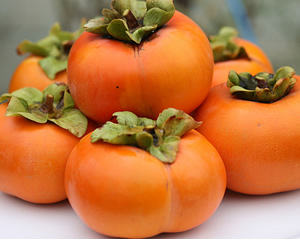Fuyu Japanese Persimmon |
|
|
Ebenaceae Diospyros Kaki Fuyu |
|
| Price |
|
| Availability and Options |
Temporarily Out Of Stock This product is temporarily out of stock. Restocks typically occur at the beginning of each week. Check back soon and sorry for the inconvenience! Other Options: |
| Shipping Information | |
| Grows In | Zone 8A · 10° to 15° F through Zone 11 · Above 40° F |
| Sun Exposure | Full / Mostly Sun |
| Soil Drainage | Well Drained |
| Resistent To | Insect, Disease, Heat |
| Average Width | 15' to 20' |
| Attracts | Visual Attention |
It prefers growing in a location that provides full sun and grows best when planted in loam, clay or silt soil that is well drained. It attracts visual attention and is resistant to insects, diseases and heat.
This is the fun part. There are lots of selections of Japanese Persimmon trees, each with their own flavor, ripening time, and more. What really determines the type you should choose is how you want to use them. Most are good for snacking. Others are great for making jam, jelly, and preserves. So do a little homework, and click on the link below to use the Japanese Persimmon Tree Information Sheet to help make your selections.
 More about Fuyu Japanese Persimmon...
More about Fuyu Japanese Persimmon...Fuyu is the most popular fresh eating Japanese persimmon in the world. This non-astringent, large, round, flattened fruit has reddish-orange skin when ripe. The shape is usually slightly squarish and flattened, similar to a beefsteak tomato or small pumpkin. Fuyu belongs to the non-astringent types because it is edible both before and after fully ripening, where as astringent varieties are only edible after fully ripening.
You won't have to wait long to enjoy the sweet fruits as Fuyu bears at a young age and is a heavy producer. The deeply orange fruit is firm, crispy and delicately sweet when not fully ripe and darker, jelly-like and amazingly sweet when fully ripe. Most fruits are sweet but Fuyu is like nothing you've ever tasted before. It is not an overwhelming sweet, but a unique, deep honey and deliciously rich type of sweet. The fruit is seedless and is excellent for fresh eating or cooking.
Health Benefits: Japanese persimmon are a rich source of antioxidants, vitamin A, manganese and fiber, especially soluble fiber. It contains a fair amount of some of the B-complex vitamins, potassium and calcium.
How To Fertilize And Water A Persimmon Tree
How And When To Harvest And Store Persimmons